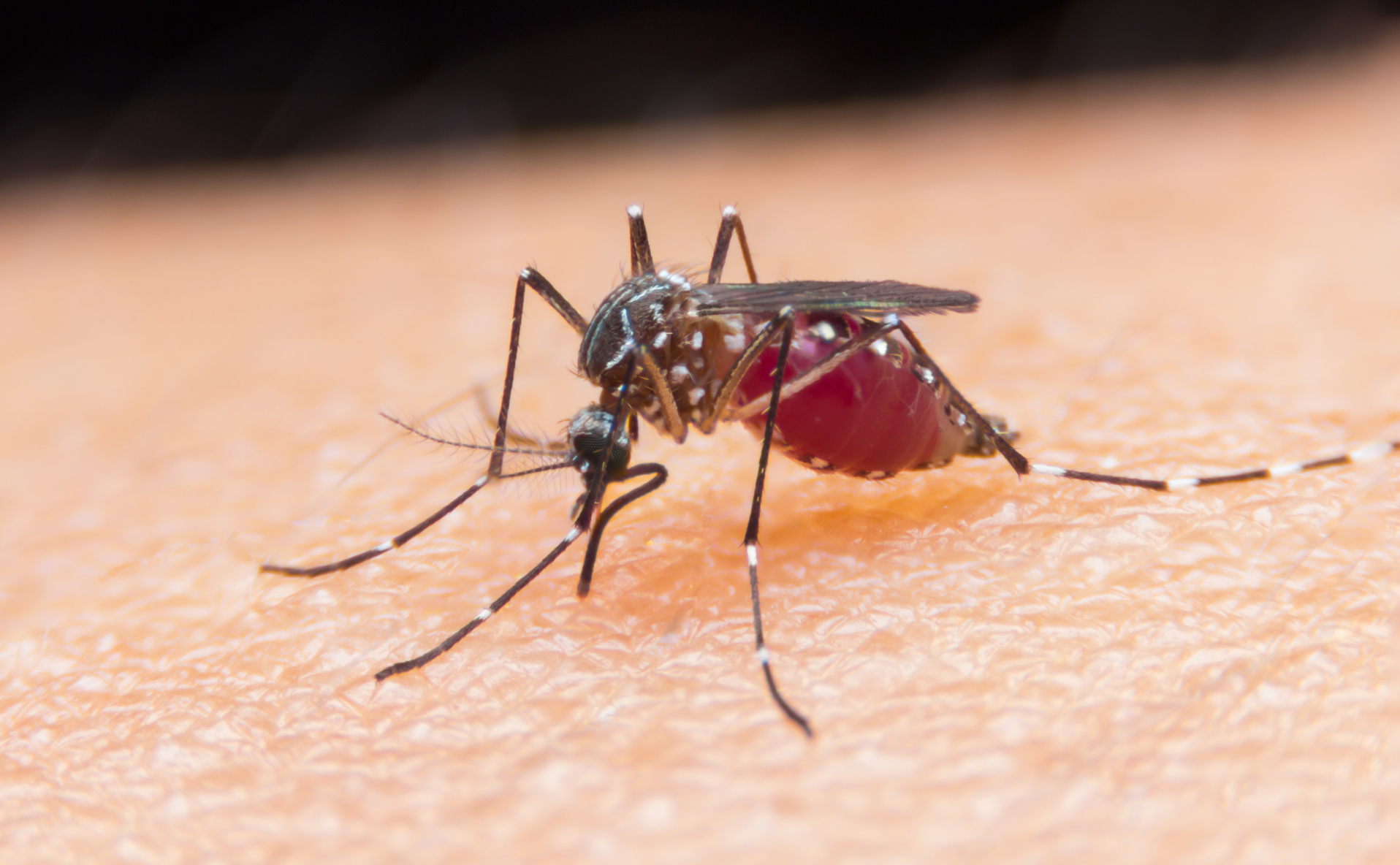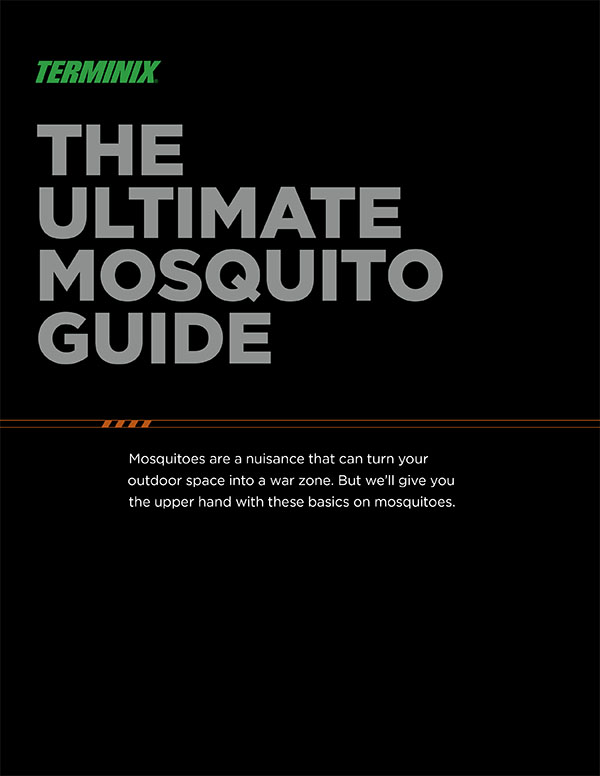Mosquitoes are a nuisance that can turn your outdoor space into a war zone. This useful Terminix guide will give you the upper hand.

Click The Downloadable Mosquito Guide Below
Read the text of the guide below:
Species and Habitat
Mosquitoes are found everywhere except Antarctica. Common habitats include swamps or marshes, forested areas, lowlands and anywhere that water is present. Most common mosquitoes fall into three groups: Culex, Anopheles and Aedes species.
Permanent Water Mosquitoes V. Floodwater Mosquitoes
Some species always lay eggs in water (Culex, Anopheles), while others (Aedes) lay eggs near water in areas likely to eventually get wet. The eggs are able to dry out and can wait for floodwaters for a year or more. When covered by water, they begin to hatch.
Common Mosquito Questions
Do mosquitoes bite year-round?
Mosquitoes are active in warm weather, and most species are dormant in winter. For most of the United States, mid-March through late summer is peak season. Anytime the temperature is above 50 degrees Fahrenheit, bet on mosquitoes being active.
Do all mosquitoes bite?
No, only female mosquitoes require bloodmeals; the proteins in blood help them lay more eggs. Male mosquitoes live off of nectar, plant sap and honeydew.
How do mosquitoes bite?
The mosquito “bites” by piercing the skin with its proboscis. Inside the proboscis are two small tubes; one injects the enzymes that prevent clotting and dull the pain, while the other sucks up blood. Read about prevention tips on Page 10.
Why do mosquito bites itch?
Mosquito saliva has enzymes that prevent your blood from clotting and dull pain. The itching is caused by a mild allergic reaction to this compound.
How do mosquitoes find me?
Their antennae have sensors that track carbon dioxide plumes. When you breathe out (releasing carbon dioxide), the mosquito zeroes in. As it gets closer, it adds chemical cues from your skin to the mix, too.
Is it true mosquitoes only bite at dusk and dawn?
No. Some species are more active during twilight hours, while others will bite during daylight.
Can a mosquito bite more than once?
Yes. Female mosquitoes need to feed every few days to keep producing eggs. They can live anywhere from two weeks to one month, which can equal quite a few bites.
I often get more bites than other people. Why?
We know that some people are more attractive to mosquitoes, but scientists aren’t sure why. Perfumes, colognes and other strong scents may draw mosquitoes.
What can I do if I've been bitten?
According to the National Library of Medicine, you should:
- Use a calamine lotion or cortisone cream to soothe the skin.
- Apply ice packs and take ibuprofen or an antihistamine.
- Avoid scratching the bites, as this can lead to infection.
- For any questions about mosquito bites, talk to a qualified medical professional.
Mosquito-Borne Diseases
According to the Centers for Disease Control and Prevention and the World Health Organization, mosquito-borne diseases continue to be a cause for concern. Here’s information on diseases, their mosquito carriers and what risk they pose to you in the U.S.
Malaria
Anopheles species
TRANSMISSION:
Mosquito bites, mother-to-child, blood transfusions, organ transplants, shared needles
SYMPTOMS:*
High fever, shaking, chills, flu-like symptoms (which can develop up to one year after exposure), anemia, jaundice
TREATMENT:
Taking antimalarial drugs before, during and after a trip to areas with malaria is often effective in preventing it; if you show signs of malaria, see a doctor to begin treatment
VACCINE:
No
FOUND:
Africa, South America, Mexico, Asia and some of the Pacific Islands. In the U.S.,outbreaks of malaria are rare. Travelers who return with the disease can possibly infect local mosquitoes. The mosquitoes can then spread it to other people. In rare cases, infected mosquitoes can enter the U.S. via airplane holds and could transmit the disease through biting.
Sources: The Centers for Disease Control and Prevention and the World Health Organization.
*If you are experiencing any of these symptoms, consult a qualified medical professional.
Dengue Fever
Aedes species
TRANSMISSION:
Mosquito bites
SYMPTOMS:*
No symptoms at all, or high fever plus two or more of the following: severe headache, joint pain, pain behind eyes, muscle/bone pain, rash, bleeding (nose, gums, easy bruising), low white blood cell count
TREATMENT:
No specific medication exists; rest coupled with analgesics (pain killers) and an acetaminophen-based fever reducer are helpful; seek medical treatment if symptoms become severe
VACCINE:
No
FOUND:
Africa, Asia, the Pacific Islands, the Caribbean, South America and Mexico. In the U.S., most cases are travelers or immigrants who contracted the disease elsewhere. However, Hawaii has had several small outbreaks of dengue in recent years.
Sources: The Centers for Disease Control and Prevention and the World Health Organization.
*If you are experiencing any of these symptoms, consult a qualified medical professional.
ZIKA VIRUS:
Aedes species
TRANSMISSION:
Mosquito bites, mother-to-child, sexual contact, blood transfusions
SYMPTOMS:*
Fever, rash, red eyes, joint pain, flu-like symptoms or no symptoms at all; confirmed links to birth defects in babies and autoimmune disorders
TREATMENT:
Rest, hydration, fever reducers
VACCINE:
In progress
FOUND:
Africa, the Pacific Islands, the Caribbean, South America and Mexico. In the U.S., travelers have returned with the disease, which has been spread via sexual contact and mother-to-child. No locally contracted cases from mosquitoes have been reported.
Sources: The Centers for Disease Control and Prevention and the World Health Organization.
*If you are experiencing any of these symptoms, consult a qualified medical professional.
Chikungunya Virus
Aedes species
TRANSMISSION:
Mosquito bites, mother-to-child (in rare instances), blood transfusions (theoretical)
SYMPTOMS:*
Similar to dengue fever; includes fever and joint/muscle pain, headache, rashes, joint swelling
TREATMENT:
No specific medication; rest, hydration and fever/pain relievers will treat the symptoms
VACCINE:
No
FOUND:
Africa, Asia, Europe, the Indian Ocean, the Pacific Islands, the Caribbean, Mexico and South America. There have been numerous cases of chikungunya reported in the U.S., but only 12 of them were locally transmitted. Florida documented a dozen cases in 2014. All other cases were travelers returning from areas where the virus is present.
Sources: The Centers for Disease Control and Prevention and the World Health Organization.
*If you are experiencing any of these symptoms, consult a qualified medical professional.
West Nile Virus
Culex species
TRANSMISSION:
Mosquito bites, mother-to-child, blood transfusions, organ transplants, laboratory exposure(theoretical)
SYMPTOMS:*
Neurologic illness (headache, high fever, stiff neck, coma, seizures), fatigue, weakness, flu-like symptoms or no symptoms at all
TREATMENT:
Rest, pain relievers, fever reducers; in severe cases, medical treatment and hospitalization are required
VACCINE:
No
FOUND:
Africa, Europe, the Middle East, North America and parts of Asia. In the U.S., it is possible to contract West Nile virus from the bite of an infected Culex mosquito.
Sources: The Centers for Disease Control and Prevention and the World Health Organization.
*If you are experiencing any of these symptoms, consult a qualified medical professional.
Mosquito Prevention Tips and Tricks
Wear light, loose clothing that leaves minimal exposed skin.
Use EPA-registered insect repellents with between 20 and 30 percent DEET.
Empty sources of standing water.
Additional Preventative Measures
- Screen your windows and use mosquito netting.
- Avoid scented products and perfumes if you’ll be outdoors.
- Keep your lawn or yard maintained.
- Fill in any low-lying areas of your yard.
- Clean your gutters often.
- Keep your pool properly maintained.
Be sure to keep this guide on hand to help answer common mosquito questions.




